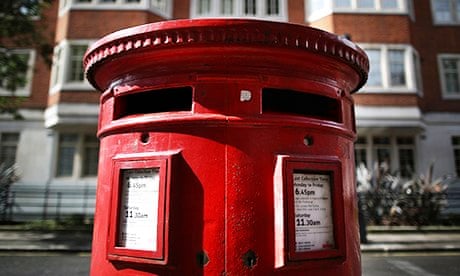One of the world's largest investment banks told ministers ahead of the Royal Mail flotation that they could sell the postal business for £10bn, around two and a half times more than the government finally received for it.
News of the valuation from JP Morgan re-ignited the huge row over the privatisation with Billy Hayes, the postal workers union leader, claiming a "conspiracy against the taxpayer" and demanding the sacking of Vince Cable as business secretary.
The government sold shares in Royal Mail for 330p each, valuing the business at £3.3bn on 11 October. But the shares rocketed in value by almost 40% that day alone and closed at 529p, making the company worth more than £5bn.
The official float figure excluded around £800m of debt, which included would give the state-owned business an "enterprise value" of £4.1bn but still almost £6bn lower than the price tag suggested by JP Morgan.
The US bank declined to comment but well-placed sources confirmed the figure of £10bn and made clear that others pitching to sell the Royal Mail on behalf of the government had also priced the mail company as high as £7bn.
The Department of Business said a whole range of different price tags had been put on Royal Mail at different stages of the sell-off process which was conducted in the most thorough way. "The banks' proposals came months before any threat of strike action by the unions, financial market uncertainty in the United States and other factors which the government has already said were taken into consideration in setting a price for the company in September," said a spokesman.
Hayes, the general secretary of the Communication Workers Union, said: "On the opening day of the flotation Vince Cable wrote off the undervaluation as froth. A week later, we were told it was the fault of the CWU. We now have a prima facie case of a conspiracy against the UK taxpayer who were opposed to the sale and have now been robbed of billions. In any other walk of life this would be a sacking offence and we call on Vince Cable to resign. A full inquiry should be launched into the mis-handling of this unnecessary privatisation by Vince Cable. We would also like the matter to be referred to the public accounts committee to scrutinise how badly the taxpayer has been left out of pocket.
Chuka Umunna, the shadow business secretary, said the development only added to fears that taxpayers have been significantly "short-changed by David Cameron's Royal Mail fire sale".
He added: "Vince Cable has said that taxpayer value was 'central' to the government's strategy in selling Royal Mail but given the extensive consultation with institutional investors and banks which took place, both he and the prime minister have serious questions to answer.
"Crucially, they must explain when the Government was made aware that the sale was so massively oversubscribed by major investors and why, having considered a higher price, they rejected that option.
"We have called for a full investigation into this matter so it is welcome that the National Audit Office has announced it will be looking into the deal and publishing its findings in the Spring."But Whitehall sources said it was not surprising that banks pitching for business might overplay the value of Royal Mail in the hope that they would win the work. They said it was like an estate agent coming round to have a look at a house and trying to persuade the owners to hire them by offering the best price available, but without the full knowledge at that point of all the circumstances.
Over 21 investment banks offered their services in May and their appointment was overseen by another City institution, Lazard. The spokesman for the Department of Business added yesterday: "The proposals included indicative valuations of the company based, in many instances, solely on information already in the public domain. Banks made their own assumptions of Royal Mail's future performance. The range was wide with the median around £3.6bn taking into account [an] IPO [initial public offering] discount." Among the banks that did win the work were Goldman Sachs and UBS.





Comments (…)
Sign in or create your Guardian account to join the discussion